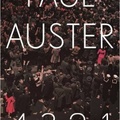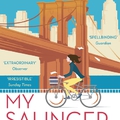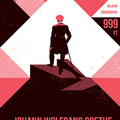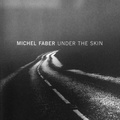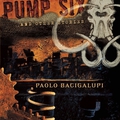Dennis Lehane: Mystic River
 (The post may contain spoilers.)
(The post may contain spoilers.)
I’ve already read two other novels by Dennis Lehane and I’ve grown to like him. However, I liked both Shutter Island and Sacred in a negative kind of way: I didn’t like them because they were exceptional books, or because they completely renewed their genre or because they made me feel something I’d never felt before. No. I simply liked them because they were decently written books, with a good story, with interesting, very human characters and with witty conversation. (Of course these are just the basics in a novel – or rather, these should be the basics in a novel – but for some reason a book featuring all the above-mentioned elements is relatively hard to come by.) So what I most liked in these novels was that there was nothing in them I could criticize – they were good in their way, without being outstanding, and even though this may sound rather condescending, I do think this meagre praise is definitely something.
However, I liked Mystic River not because it’s not bad at all, but because it’s an excellent novel. The protagonists of the novel are three men who used to be friends in their childhood. They fooled around together all the time, until one day something happened: one of the boys, the loser of their bunch, Dave hopped into the car of the men who at first sight looked just like policemen, and when he finally escaped from the in-fact-not-policemen after four days and went home, suddenly nothing was the same as it used to be. Due to his experiences, Dave developed something very much like a split personality; his friend, Jimmy – a silent, moody, nonchalant but very emotional boy – felt sadness settling on his heart; and the third boy, Sean slowly drifted away from the old bunch, as he was always a good boy, he lived in a better neighborhood and had a more normal family than the others – so he probably couldn’t have been the friend of the other two boys for long, anyway.
Twenty-five years later Dave is still an average loser; Jimmy, an ex-criminal and now the owner of a shop lives happily with his family; and Sean works as a detective while suffering constantly because his pregnant wife had left him a year before. Of course the childhood friendship of these three men ended long ago (although Jimmy and Dave are related through their wives), but the brutal murder of Jimmy’s daughter, Katie brings them together again, because Sean is the detective investigating the case, and it seems that Dave might have committed something terrible on the night of the murder.
So, Mystic River is supposedly a crime novel. It certainly features a murder, a murderer, and a couple of typical doughnut-munching, coffee-gulping, alcoholic and/or workaholic cops who have no private life whatsoever, who like to fire witticisms at everybody and who are so extremely tough that when they see a half-rotten corpse in the trunk of a car, they go ahead and jokingly ask their colleague whether he would care for a sandwich.
However, as regards the typical elements (clichés) of a crime novel, Dennis Lehane stops right here, and the majority of the novel consists of a thorough analysis of the characters’ inner lives and feelings. And Lehane does this remarkably well – in a heartrendingly emotional, yet totally understated, quiet way. The way Dave fights his demons; his wife’s, Celeste’s dilemma whether she should stand by her husband or betray him; Sean’s helpless rage and the hopeless emptiness in his heart left by her wife’s departure; the grief Jimmy feels after the death of his daughter; the perhaps exaggerated („I will never love anyone this much again”) but definitely serious heartache suffered by Katie’s boyfriend Brendan – all these are depicted in such a way that I was very close to shedding tears at several points in the novel.
Besides the constant analysis of the characters’ inner torments, the main theme of the novel is the question how a person’s life becomes what it is. Are there any moments in a life after which things inevitably change? And how is it possible to live with the idea that the smallest decision might change the course of a life forever? Put this way, these questions may seem like the questions in some cheap, pop-psychological, mystical novel just like the ones of Paulo Coelho. But Dennis Lehane is no Coelho, and his characters don’t act as if they were hugely talented geniuses in the fields of psychology and philosophy who can redeem themselves, the others or the whole world in a simple way – so Mystic River treats these questions with taste and delicacy.
It’s an interesting question who had the worst life of the three men. Judging objectively, Dave seems to be the most pitiable of the three, because he was robbed of his chance to grow up to be a healthy, mentally stable man at a very early age. However, it was Jimmy I pitied the most: his quiet, sad, deeply emotional personality and his wildness make for a very strange mixture, and his suppressed, almost unbearable and inexpressible pain is very painful to witness even from the outside.
It’s strange that by eliminating Dave at the end of the novel, it seems that order is finally restored to the two men’s life (of course I ignore the fact that order is not restored to the life of Celeste – but this novel is more about the three men than about anybody else): Sean’s wife comes home, and Jimmy finally becomes strong enough to start to deal with his grief in some way.
Is this a happy end? We get rid of the poor, psychologically damaged loser with a life screwed up mainly by others, and then everybody is happy? I wouldn’t say so, since it’s only too obvious that both Sean and Jimmy paid a huge price for this order and perhaps-happiness. And I’ve got a notion that probably both of them will keep thinking a lot about the day Dave hopped into that ominous car – and the different life they could have had, had Dave not done so.

